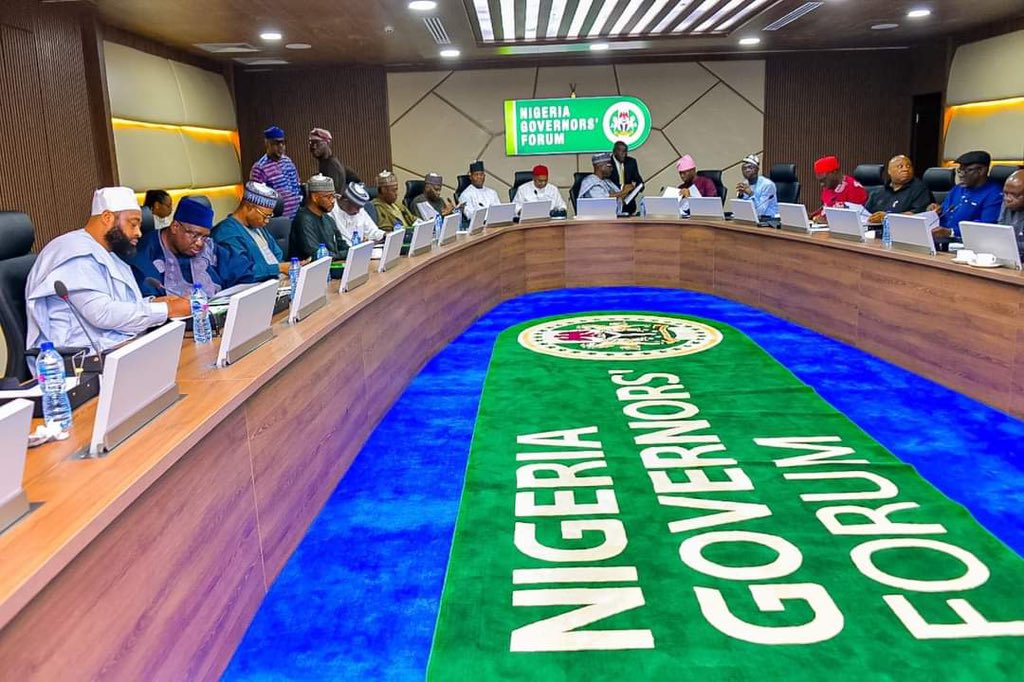The Nigeria Governors Forum (NGF) has officially endorsed the Federal Government’s tax reform bills, marking a significant milestone in the country’s efforts to modernize its tax system.
However, the NGF has also proposed a new sharing formula for Value-Added Tax (VAT), which would allocate funds based on the following criteria:
– Equality: 50% of VAT revenue would be shared equally among states
– Derivation: 30% would be allocated based on derivation, ensuring states receive a fair share of revenue generated within their borders
– Population: 20% would be distributed based on population, recognizing the unique needs and challenges of each state.
This revised VAT sharing formula aims to promote equitable distribution of resources, ensuring that all states benefit fairly from the country’s tax revenue.
Following a meeting of the Nigeria Governors’ Forum (NGF) and the Presidential Tax Reform Committee on Thursday in Abuja, the NGF “reiterated its strong support for the comprehensive reform of Nigeria’s archaic tax laws.”
The governors acknowledged the importance of modernising the tax system to enhance fiscal stability and align with global best practices.
On VAT, they proposed a revised sharing formula, which they said would ensure equitable distribution of resources.
“Members agreed that there should be no increase in the VAT rate or reduction in Corporate Income Tax (CIT) at this time, to maintain economic stability”, the communique issued by NGF Chairman and Kwara Gov. AbdulRahman AbdulRazaq said.
According to a communique, the Forum advocated for the continued exemption of essential goods and agricultural produce from VAT to safeguard the welfare of citizens and promote agricultural productivity.
It added: ”The NGF recommended that there should be no terminal clause for the Tertiary Education Trust Fund (TETFund), National Agency for Science and Engineering Infrastructure (NASENI), and National Information Technology Development Agency (NITDA) in the sharing of development levies in the bills”.
Despite the heated debates that the tax reform bills have generated, the governors said they support the “continuation of the legislative process at the National Assembly that will culminate in the eventual passage of the Tax Reform Bills”.
Persecondnews recalls that in 2024, President Bola Tinubu sent four tax reform bills to the National Assembly for its consideration and passage.
They include the tax administration bill, Nigeria tax bill, and joint revenue board establishment bill as well as a bill to repeal the law establishing the Federal Inland Revenue Service (FIRS) to be replaced with the Nigeria Revenue Service.
But the move has been met with pushback from several sections of the country notably the northern governors and some leaders in the North.
They asked the National Assembly to reject the bills, claiming they were against the region.
Tinubu, however, vowed not to withdraw the bills with the presidency assuring that they are not against any section of the country, rather, they are to improve the lives of Nigerians.
The full text of the communique: “We, members of the Nigeria Governors’ Forum (NGF) and presidential tax reform committee, convened on the 16th of January 2025 to deliberate on critical national issues, including the reform of Nigeria’s fiscal policies and tax system, and arrived at the following
resolutions:
The Forum reiterated its strong support for the comprehensive reform of Nigeria’s archaic tax laws. Members acknowledged the importance of modernizing the tax system to enhance fiscal stability and align with global best practices.
The Forum endorsed a revised Value Added Tax (VAT) sharing formula to ensure equitable distribution of resources:
50% based on equality
30% based on derivation, and
o 20% based on population
3. Members agreed that there should be no increase in the VAT rate or reduction in Corporate Income Tax (CIT) at this time, to maintain economic stability. The Forum advocated for the continued exemption of essential goods and agricultural produce from VAT to safeguard the welfare of citizens and promote agricultural productivity.
4. The meeting recommended that there should be no terminal clause for TETFund, NASENI, and NITDA in the sharing of development levies in the bills.
5. The meeting supports the continuation of the legislative process at the National Assembly that will culminate in. the eventual passage of the Tax Reform Bills.























Leave a comment